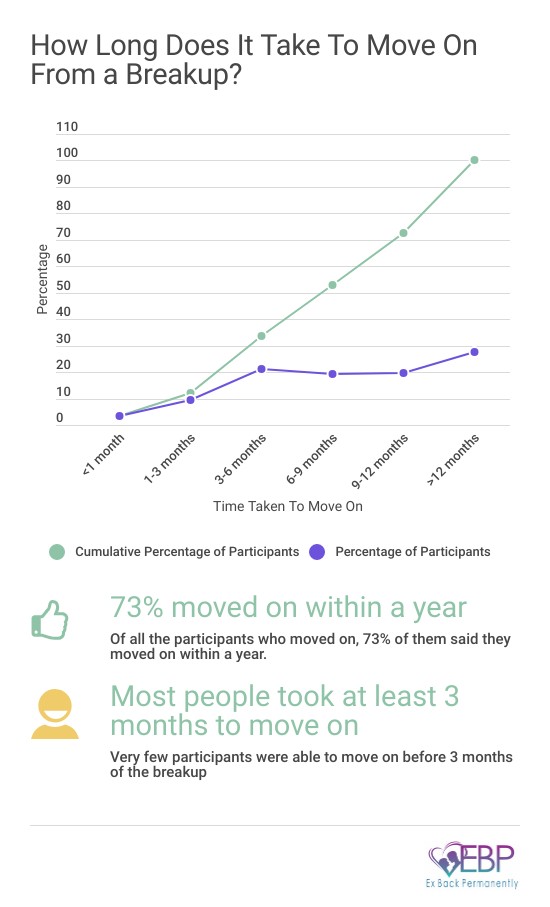Why Am I Still Thinking About My Ex all the time? At WHY.EDU.VN, we understand how challenging it can be when thoughts of a past relationship linger. This comprehensive guide provides insights and actionable strategies to help you understand these persistent thoughts and move forward, focusing on coping mechanisms, healing strategies, and regaining emotional independence. Discover how to stop dwelling on your former relationship and find peace of mind with expert advice and practical solutions.
1. Why Can’t I Stop Thinking About My Ex? The Core Reasons
If you find yourself constantly replaying memories or wondering about your ex, it’s crucial to understand the underlying causes.
Several factors contribute to this common experience:
1.1 Attachment Style, Self-Esteem, and Personality Traits
Your attachment style significantly influences how you process breakups. According to research from the University of Basel, individuals with low self-esteem tend to ruminate more, increasing the likelihood of depression. If you possess traits like perfectionism or neuroticism, you might overanalyze what went wrong, seeking ways to fix it. Such individuals often prioritize their partner’s needs, struggle with boundaries, and fear losing their ex forever or not finding love again. Introverts, known for overthinking, may also find it harder to let go.
1.2 The Significance of Your Past Relationship
The perceived importance of the relationship plays a vital role. Some view their ex as a soulmate, while others tie their self-esteem and identity to the relationship. Losing such a connection can feel like a significant loss, leading to constant thoughts of reconciliation to regain their sense of self. These relationships often exhibit co-dependency, characterized by an unhealthy reliance on each other for self-worth.
1.3 The Shock Factor of the Breakup
A sudden or unexpected breakup can leave you in shock, triggering persistent thoughts as you try to process what happened. Similarly, if your ex quickly moves on, it can amplify the shock and increase rumination.
1.4 The Desire to Get Them Back
Thoughts revolving around reconciliation are common, driven by fears such as your ex moving on or ceasing to love you. These thoughts stem from low self-esteem, anxious attachment styles, or co-dependency. While some couples successfully reconcile, approaching reconciliation from a place of fear can push your ex away or lead to unhealthy relationships.
2. When Does Thinking About an Ex Become a Problem? Recognizing the Signs
While thinking about an ex is normal, it becomes problematic when it affects your well-being.
2.1 Frequency and Duration
If thoughts about your ex don’t decrease over time, it can lead to frustration and a sense of losing control.
2.2 Emotional Impact
Experiencing extreme distress, sadness, or regret from these thoughts indicates a problem.
2.3 Impact on Current Life
These thoughts can hinder your current relationships, decisions, and overall well-being, preventing you from moving forward.
2.4 Helplessness
Feeling helpless and unable to control your thoughts requires strategic intervention.
2.5 Lack of Progress
If you haven’t made any progress since the breakup, these thoughts are likely a significant obstacle.
2.6 Mental Health Risks
According to the American Psychological Association, constant rumination can lead to depression. If you experience persistent negative thoughts, depression, or extreme stress, seek professional help immediately.
3. Practical Strategies: How To Stop Thinking About Your Ex
Here are practical, actionable steps to help you reduce the time you spend thinking about your ex and facilitate healing.
3.1 Understanding Thought Patterns
Recognize the patterns contributing to constant thinking.
| Pattern | Description | Example |
|---|---|---|
| Romanticizing the Past | Focusing on good memories and ignoring bad ones, leading to doubts about the breakup and a desire to reconcile. | Remembering the romantic dates but forgetting the constant arguments. |
| Ruminating over Past Events | Continuously replaying past events, seeking insight into what went wrong, often involving “what ifs”. | “What if I had been more attentive? Would we still be together?” |
| Intrusive Thoughts | Obsessive thoughts about what your ex is doing, whether they still love you, or ways to get them back. | Constantly checking their social media to see if they’re dating someone new. |
| Fantasies | Fantasizing about getting back together or the worst-case scenario of them moving on, accompanied by an all-or-nothing mindset. | Believing you will either get back together or never find love again. |


3.2 Remove the Fuel: Implement No Contact
Cut off all contact to stop feeding your brain new information about your ex, which can trigger obsessive thoughts. This includes:
- No texting or phone calls.
- No social media stalking.
- Avoiding places they frequent.
- Setting boundaries with mutual friends.
3.3 Strategic Thought Processing
Identify the core reason for your thoughts and reframe them to focus on what you can control.
| Original Thought | Reframed Thought | Actionable Steps |
|---|---|---|
| “I want to know why he broke up with me.” | “I don’t want to make the same mistakes again.” | Learn from past mistakes, improve communication skills, and understand your role. |
| “I don’t want him/her to move on from me.” | “I want to try my best to get him/her back.” | Stop acting desperate, give them space, become a better person, and be honest about your feelings. |
3.4 Focus on Actions You Can Control
Develop actionable steps to address the issues that led to the breakup. If low self-esteem was a factor, work on improving it through self-acceptance and healthy boundaries.
3.5 Analyze Thought Patterns by Writing Them Down
Keep a journal to record your thoughts and identify recurring patterns. Note whether you are romanticizing the past, ruminating over mistakes, or obsessing over the future.
3.6 Stop the Momentum with Distraction
Interrupt obsessive thoughts by engaging in activities that require your full attention, such as exercising, hobbies, or learning new skills.
3.7 Allow Time for Healthy Processing
Dedicate a specific time each day to think about your ex strategically. Use this time to analyze your thoughts, identify what you want, and determine actionable steps.
3.8 Gain Insights
List things you liked and disliked about your ex and yourself during the relationship. Identify key insights and remind yourself of them when unwanted thoughts arise.
3.9 Seek External Perspectives
Ask friends and family about their perspectives on your relationship. Their insights can provide valuable clarity and help you understand the breakup.
3.10 Allow Yourself to Feel All Emotions
Acknowledge and accept your emotions without suppression. Suppressing emotions can lead to more significant psychological issues.
3.11 Practice Gratitude
Engage in regular gratitude practices to calm your mind and refocus on the present. Focus on the positive aspects of your life and the people who support you.
3.12 Focus on Positive Self-Care and Self-Improvement
Prioritize self-care and self-improvement activities.
- Physical Activities: Exercise releases endorphins and improves mental health.
- Mental and Spiritual Self-Improvement: Work on your self-esteem, communication skills, and personal growth.
- Social Support: Spend time with loved ones to remind yourself that you are not alone.
4. Common Mistakes to Avoid During Healing
Steer clear of these common pitfalls to ensure you don’t prolong the healing process.
4.1 Continuously Keeping in Contact with Your Ex
Avoid feeding your brain new information about your ex, which perpetuates obsessive thoughts.
4.2 Suppressing Your Thoughts
Process the breakup instead of suppressing your thoughts, which can lead to mental health issues.
4.3 Suppressing Your Emotions
Allow yourself to feel emotions instead of running away from them, which can lead to long-term psychological issues.
4.4 Giving False Hope About Reconciliation
Remind yourself you will be fine without your ex and avoid creating false hopes for reconciliation.
4.5 Isolating Yourself
Lean on friends and family for support instead of isolating yourself, which can prolong healing.
4.6 Escapism
Avoid addictive behaviors, like drugs or excessive alcohol, that only provide temporary relief.
5. Why Do People Want to Stop Thinking About Their Ex?
Thinking about an ex is often painful because it brings up past memories. The same way they feel their ex stopped caring.
5.1 Reliving Painful Moments
The end of a relationship can be one of the most stressful events in your life. And thinking about it sometimes feels like you are reliving those painful moments.
5.2 Loss of a Significant Connection
Finding love is like winning “life’s greatest prize.” So when you think about the good memories together, it’s a reminder that not only you have lost the great prize, but you may never win that prize ever again.
6. How Long Does It Take to Stop Thinking About Your Ex? Time and Healing
Most people move on within 3-12 months. The longer the relationship, the longer it may take to heal.
| Relationship Duration | Expected Healing Time |
|---|---|
| Less than 2 years | Within 9 months |
| More than 2 years | More than 9 months |
| More than 5 years | More than a year |
7. Addressing Specific Scenarios
Here are answers to common questions about thinking about your ex.
7.1 Thinking About My Ex Even After They Have Moved On
Cut all contact, focus on self-improvement, and process your thoughts strategically.
7.2 Thinking About My Ex Even Though I Am Over Him
A part of your mind is just used to thinking about him and having him in your life.
7.3 Suddenly Thinking About an Ex From Years Ago
It’s normal and it’s probably nothing to worry about.
7.4 Still Thinking About My Ex Regularly After So Many Years
Revisit what happened in the relationship and the breakup and find out what you need to learn from the past.
7.5 In a New Relationship But Still Thinking About My Ex
If your new relationship is going well, then it’s probably not a good idea to share that with your new boyfriend or girlfriend.
7.6 Is It Okay to Think About Your Ex When Having Sex with Your New Partner?
It’s a sign that you are not sexually satisfied in your new relationship.
7.7 I Wake Up Thinking About My Ex
Yes, it’s normal to wake up thinking about your ex even after months or years of the breakup.
8. Will Thinking About My Ex Stop Me From Moving On?
If you try to process your thoughts about your ex in a healthy way, it’s not going to stop you from moving on.
9. Does Your Ex Also Think About You?
Yes, your ex also thinks about you, and they will probably continue doing so for a long time (especially if your relationship was a significant part of their life).
10. Need More Answers? Ask the Experts at WHY.EDU.VN
Are you struggling to understand why am I still thinking about my ex? Breakups can be overwhelming, and finding reliable information can be challenging. At WHY.EDU.VN, we provide expert-backed answers to your most pressing questions.
Address: 101 Curiosity Lane, Answer Town, CA 90210, United States
WhatsApp: +1 (213) 555-0101
Website: WHY.EDU.VN
Our team of experts is ready to help you navigate your healing journey. Don’t let confusion hold you back—visit WHY.EDU.VN today to ask your questions and find the support you need to move forward confidently.
11. FAQ: Common Questions About Thinking About Your Ex
Q1: Why do I keep romanticizing my past relationship?
Romanticizing the past is a common coping mechanism where you focus on the good aspects and ignore the bad. It can lead to unrealistic expectations and hinder your ability to move on.
Q2: How can I stop ruminating over past events with my ex?
Try to identify the core reasons for your thoughts and reframe them to focus on actions you can control. Writing down your thoughts and analyzing them can also help break the cycle.
Q3: What should I do when I have intrusive thoughts about my ex?
Distract yourself with activities that require your full attention. Engage in hobbies, exercise, or spend time with friends and family to shift your focus.
Q4: Is it normal to fantasize about getting back together with my ex?
Yes, it’s normal to fantasize, but it’s important to balance these fantasies with reality. Avoid getting caught up in an all-or-nothing mindset and focus on what is best for your well-being.
Q5: How does cutting off contact help me stop thinking about my ex?
Cutting off contact removes the fuel for your thoughts by eliminating new information about your ex. This helps your brain focus on other things and facilitates healing.
Q6: Why is it important to allow myself to feel all emotions after a breakup?
Suppressing emotions can lead to long-term psychological issues. Allowing yourself to feel your emotions helps you process the breakup and heal in a healthy way.
Q7: How does practicing gratitude help me stop thinking about my ex?
Gratitude helps you focus on the positive aspects of your life and appreciate what you have. This can shift your focus away from the breakup and reduce feelings of sadness and regret.
Q8: What self-care activities can help me stop thinking about my ex?
Physical activities, mental and spiritual self-improvement, and social support are all effective self-care activities. Choose activities that bring you joy and help you focus on your well-being.
Q9: Is it possible to move on from my ex even if they have moved on?
Yes, it is possible. Focus on cutting off contact, self-improvement, and processing your thoughts strategically to facilitate healing.
Q10: How can I seek professional help to stop thinking about my ex?
Consider consulting a therapist or breakup coach who can help you process your thoughts, identify underlying issues, and develop strategies for moving forward. why.edu.vn offers resources and expert advice to support your healing journey.
